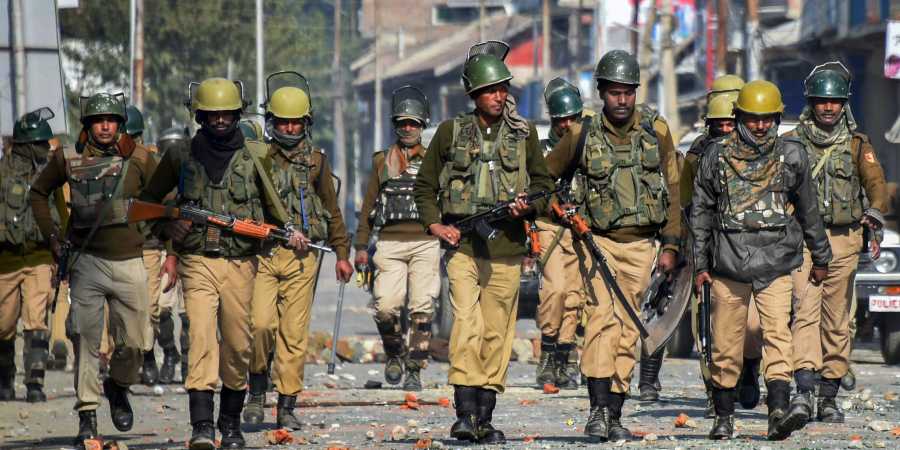Rajya Sabha passes Jammu and Kashmir Reorganisation Bill

The government moved another eight battalions to the state, pushing the total strength of security forces to almost 600,000 soldiers who are engaged in anti-militancy operations.
Uncertainty and a communications blackout has gripped the entire Kashmir valley since the upper house of the Indian Parliament hurriedly approved a surprising bill to change the basic structure of the state, which has been a bone of contention with neighbouring Pakistan.
On Monday morning, union home minister Amit Shah moved a bill in the Rajya Sabha, the upper house of the Indian Parliament, to revoke Article 370 in Parliament. The Article 370 gives Jammu and Kashmir its own constitution and decision-making rights for all matters barring defence, communications and foreign affairs. Its removal ends special status for Kashmir, which was a key condition to its accession to India in 1947.
“The entire constitution will be applicable to Jammu and Kashmir state,” said Shah while moving the bill, which was rushed through the house and had been passed before the end of the day, despite vociferous protests by the opposition Congress and several other political parties. The bill will now be moved in the Lok Sabha, the lower house of the parliament where again it will sail as the ruling Bharatiya Janata Party enjoys a comfortable majority. After both the houses pass the bill, it would be sent to President Ram Nath Kovind for his approval and enforcement as a law.
Shah also introduced a bill to bifurcate Jammu and Kashmir into two union territories, which was passed in the Rajya Sabha. Ladakh will have a separate identity as Union Territory much like five other centrally administered areas which don’t have separate legislatures of their own, but Jammu and Kashmir will have a legislature, even though it would still be governed directly from Delhi on key issues.
The announcement, though a surprise in the details, was not entirely unexpected. Speculations that the government was upto something major in the state had been rife for over a week, when the government first airlifted 35,000 central paramilitary forces to reinforce the half a million strong force already in place in the state. The government also cancelled halfway through a key spiritual pilgrimage, the Amarnath Yatra, and advised all the pilgrims, tourists and other non-residents of the state to leave immediately in face of what it termed serious terror threats.
For once, it was the government that created a panic and made rumour mills churn non-stop, creating an atmosphere of fear and confusion in the Valley, last week. On the weekend, the government moved another eight battalions (8000 personnel) to the state, pushing the total strength of security forces to almost 600,000 soldiers who are engaged in anti-militancy operations. It also shut all schools and colleges in the whole state.
The government also banned all political and social rallies and gatherings and banned even small groups of more than four persons in the valley. Key political leaders of the state were put under house arrest on Sunday night and were formally arrested on Monday, moments after the bill was passed in the parliament. These include former Jammu and Kashmir chief ministers Mehbooba Mufti and Omar Abdullah, including Jammu and Kashmir People’s Conference leaders Sajjad Lone and Imran Ansari.
“The situation in Kashmir is highly tense and intense. The central government and the governor themselves created this panic and ruckus in the valley. The central government is to be blamed for this situation. We all are waiting for any further step. By imposing section 144, they are killing the democracy,” said, Mohammad Akbar Lone, National Conference MP.
Kashmir is currently under the Indian federal government’s rule, after Bharatiya Janata Party (BJP) withdrew from a coalition there with the regional Peoples Democratic Party, last year.
Black out in Kashmir
The telephone and Internet services have been suspended in the Valley and only police officials and district magistrates have been provided with satellite phones. Barricades have been erected on many arterial roads, including the entry and exit points to Srinagar. According to officials, riot control vehicles have been kept on standby in some areas where apprehension of law and order disturbances is more and security deployment at vital installations have been stepped up.
All educational institutions have also been suspended until further notice. Students hailing from other parts of the country were asked to return to their home states amid heightened security last week. The Indian Army and Indian Air Force have been put on high alert too.
“The entire Valley is under curfew. Political leaders including three former chief ministers are under house arrest. There is a war-like situation in the state. So this should be discussed on priority,” said Ghulam Nabi Azad, leader of Opposition in Rajya Sabha.
Last week people were seen lining up at departmental stores in the city and elsewhere to stock up dry ration and essentials, apprehending deterioration in the law and order situation. Long queues were seen outside petrol pumps.
Omar Abdullah, former chief minister of the state, alleged that some of his friends in Gulmarg hotels had been forced to leave.“To the people of Kashmir, we don’t know what is in store for us but I am a firm believer that whatever Almighty Allah has planned it is always for the better, we may not see it now but we must never doubt his ways. Good luck to everyone, stay safe & above all PLEASE STAY CALM,” said Abdullah in a tweet moments before he was put under house arrest on Sunday.
The blackout of information from Kashmir is likely to enhance the panic, especially amongst Kashmiris living in other parts of the country. But it is also certain that the government cannot keep the lid on the information flow for too long and news about people’s reactions, protests and other developments on the ground are likely to emerge in a short while.









